Transfiguration Despite Many Difficult Challenges:
Posted by Fr. JonathanApr 26
Our pilgrimage to the Holy Land was a ‘Transfiguration Time’, in which people – many of us – were taken out of our own personal preoccupations, to be given a glimpse of something else: the beyond, the presence of Love, the support of, and caring of others. Someone who wrote to me last week spelt it out like this: “Like you, the week just glows in my mind, whenever I think back.” If you read the Transfiguration accounts in the New Testament, you find in Luke (9: 31) that Moses and Elijah spoke of Jesus’ departure from his friends, “… that he would soon fulfil God’s purpose by dying in Jerusalem”. Matthew and Mark explain, straight after their Transfiguration accounts, “… that Jesus would suffer many things and be treated with contempt.” (Mt 17: 12 and Mk 9:12).
We pilgrims, too, ‘in the footsteps of Jesus’ were surrounded by tensions and sufferings, and these became evident in many different ways. In Nazareth, there is a mosque right next to the Basilica of the Annunciation, and the mosque carried the following large sign –with its spelling mistake – not to be missed by pilgrims approaching the Basilica.
 |
If Islam was truly lived as it was meant to be, and, similarly, if Christianity was truly lived as it was meant to be, we would all discover, deep in the true spiritual roots of both, not conflict, but solidarity. After all, both religions have the ‘Golden Rule’ within their teachings: “Do unto others, as you would have others do unto you”; it is the same for every major religion in the world. Then such a sign would be perfectly acceptable, as the losers would be those who did not do unto others as they would have others do to them, one of the teachings of the Gospel and the Koran.
This poster, it would seem, was not displayed with the Golden Rule in mind! Also, it becomes apparent that, wherever there is a Christian Church, the Muslims love to put a mosque on its doorstep, and, from the minaret, comes a very loud call to prayer, just before dawn. It is something one gets used to, but it can be a little disconcerting to be woken up at about 3.30 am, as in both Nazareth and Bethlehem, or to have Mass interrupted by the very loud speakers, as the Muslim call to prayer is made; this happened in Jericho, where we had Mass at noon, in the Catholic Church. Once again, the ‘Golden Rule’ comes to mind. Tensions again were apparent on the fourth day of our pilgrimage, as we left Nazareth. We were to stay in Bethlehem which is near Jerusalem. On the way, we had our first stop at the recently opened clearway in the Israeli military zone, as we drove through a minefield, on a road cleared of mines.
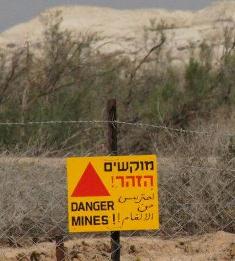 |
When we arrived at the River Jordan, at “Bethany beyond the Jordan” (Jn 1:28), we were at a point on the border between the Kingdom of Jordan, and the State of Israel, the border being marked out by the river. The Jordanian side was ‘empty’ when we visited it; a Christian Church stands on that side of the border. On “our” side, so to speak, two Israeli soldiers scrutinised every person; they carried automatic weapons ready to shoot at any person who might want to cross to the other side. As for we pilgrims, the hot sun was beating down, and we simply stood in awe, at the great event that had taken place here, and we did something momentous: we renewed our baptismal vows, and it was very meaningful, followed by gestures such as seen in the photo below.
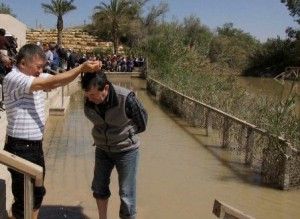 |
Somebody gave me an empty water bottle, and this we filled with water from the Jordan; it is now being used for baptisms in the Parish. Probably all of us should grow in our appreciation of the gift of Baptism, and, having this ‘Jordan water’ is a good reminder of our insertion into Christ through what happened to most of us as babies – our baptism. The muddy water took a long time to settle and become clear, but now it has – a simple reminder of how long it takes truly to appreciate personal baptism.
Jericho is an oasis in a surrounding desert area. Close by, are the hills that lead to Jerusalem, and the Dead Sea is nearby. Here we experienced, once again, how the Holy Land is a land flowing with milk and honey, with pomegranates, figs and all manner of good things; in Jericho, we visited a restaurant where one could eat as much as one wanted, of simply delicious food. Also, there was a shop, where, at very good prices, one could buy dates and nuts, fruit and delicacies, as well as shawls, trinkets, and all the usual tourist attractions, at very good prices. No Jew ever enters Jericho; it is a part of the West Bank, where the Palestinians live, and Jews would enter only at the risk of their lives! Here, one could not miss seeing a famous sycamore tree, like the one climbed by Zacchaeus (Lk 19: 4).
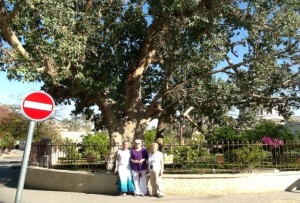 |
Of course, being tourists as well as pilgrims, we did all the ‘touristy’ things, like visiting Qumran, of the famous ‘Dead Sea Scrolls’, and swimming in the Dead Sea; those who wished, could have themselves covered with the therapeutic mud of that Sea, which just happens to be the lowest point of the earth.
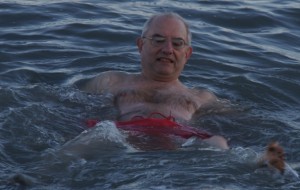 |
Next on our agenda, we drove up into the mountains, stopping in the desert for an unforgettable 20 minutes, at which point it was easy to contemplate the conditions – the kind of terrain – in which Jesus spent those 40 days and 40 nights. It was so cold, so unforgivingly barren, that it was really good to take a short stroll away, into this environment, and let the reality of it sink in. It says in the New Testament – after his baptism – that: “The Spirit immediately drove Jesus into the wilderness. And he was in the wilderness forty days, tempted by Satan; and he was with the wild beasts” (Mk 1:12-13).
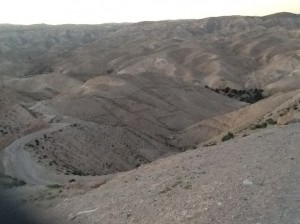 |
Eventually, we arrived in Bethlehem; translated, the name means ‘house of bread’. We did not have to negotiate our way through the (in)famous ‘wall’ as our route took us through back streets, up and down some hills and dales, with busy narrow Palestinian streets, full of life and friendly people. However, as this account is making reference to the difficulties of life, in the Holy Land, as a ‘back drop’ to the ‘Transfiguration’ experience that our pilgrimage undoubtedly was, it is good to have a picture of this famous Israeli construction, a ‘snip’ at 470 miles in length.
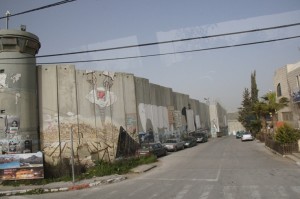 |
It would be rather unfair to say that the Palestinians ‘live in a prison’, but it is true to say, that the majority cannot leave the West Bank, and come back again; they cannot visit Jerusalem, just next door to their town. They cannot enjoy the excellent medical facilities available to those who live in Jerusalem. Palestinians, in the West Bank, behind check points at the wall, and internal check points in their territory, feel oppressed and humiliated, by the treatment that they receive. Furthermore, they have few chances to develop their own potential, within their territories; many are unemployed, even those with excellent qualifications, like the architect, we met, who is without work. He had his offices destroyed, in the second ‘Infatada’. Particularly badly hit’ are the Palestinian Christians’ who are leaving the Holy Land’ and the whole Middle East’ because of the political and social conditions surrounding them.
At the same time, there are almost no bombs in Jerusalem since the wall was built, and the Israelis do not feel oppressed; rather they feel uneasy and afraid. They know that world opinion is against them, and they know that the Muslim world, in general, is very hostile towards them. On the whole, the Israeli Jew has no contact with the Palestinians, and of course, extremists, on both sides, take up positions that are simply incompatible with dialogue.
It was a great joy for all of us, one cold night, to visit a Palestinian family, in Bethlehem, and have our evening meal with them. Not only did we eat very well, kebabs and all the Palestinian trimmings, but we also shared with them a little of what life was like. They strive to live the Gospel to the full, and one of the precepts of Jesus, that is hard for everyone, is found in Matthew 5:
“You have heard that it was said, “An eye for an eye and a tooth for a tooth.” But I say to you, do not resist an evildoer. But if anyone strikes you on the right cheek, turn the other also; … Love your enemies and pray for those who persecute you”. (Mt. 5:38-44).
They declared quite openly that “loving their enemy” is one of the hardest things they have to do. They gave examples; one was that, at Christmas and Easter time, they apply for visas to visit Jerusalem, see their relatives and friends there, and visit the Christian sites. Usually, and randomly, they will receive a visa for Mum or Dad, and often the children, but not both adults together. So nobody goes at all, as they cannot leave the children with one parent. It is very hard, but this is what they do “loving those who impose such rules”, as Jesus taught. They also have very little security, just like all their fellow Palestinians.
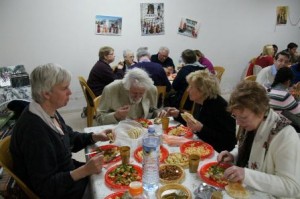 |
In truth, it was an eye-opener to see the joy and peace in these good peoples’ eyes and hearts. As somebody wrote:
“We met a Christian Palestinian family and were moved by their story of life in Bethlehem. It put my troubles into perspective. My suffering was not influenced and made worse by someone else – there would be an end to my grieving process. They lived every day not knowing when their suffering would end, but they lived in hope and with the love of God in their lives.”
Here we see the Palestinian father and mother who were an inspiration.
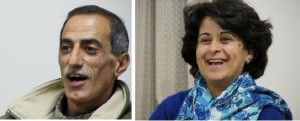 |
To show how their joy spread to us all, here are some pictures of one or two of our pilgrims on that evening:
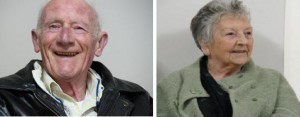 |
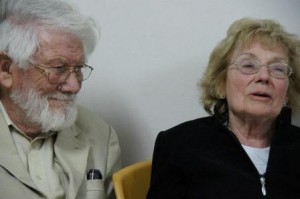 |
Hope springs eternal, and there is usually a way ‘round’ obstacles, to give at least peace of mind! This saying was reinforced by meeting, two or three days later, with a young Israeli girl, in Jerusalem, who spent 22 years of her life in London, but has immigrated, with her family, to Israel. She told us how hard it was to engage in inter-faith dialogue, in Israel, compared with London – objections coming most often from fellow Jews – and how she was dedicated to the cause of promoting unity, as a strong, and devout Jewish believer. She had found that it was often her own fellow Jews, in Israel, not just the Palestinians, who found a ‘blockage’ relating to her, in her activities, and in her very presence. She told us about days of dialogue with Jews, Christians and Muslims, together, that are developing in the spirit of unity of the Focolare. It was very hard at the beginning, but friendship and mutual understanding, are growing. She was a lovely breath of ‘fresh air’ for us all, and we were all impressed by her testimony, her joyful freshness and her point of view, describing what it is really like to live in the Holy Land, as a believing, caring young Jewish girl.
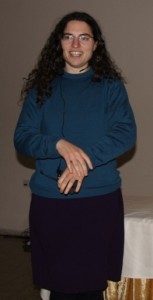 |
All these things make me want to pray for the peace of Jerusalem, and, God willing, that will be the theme of next week’s reflection.
In order to view the blog in its original formatting, readers are advised to visit the main blog site.

No comments